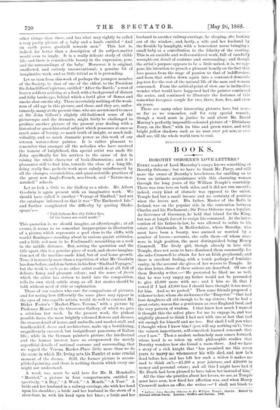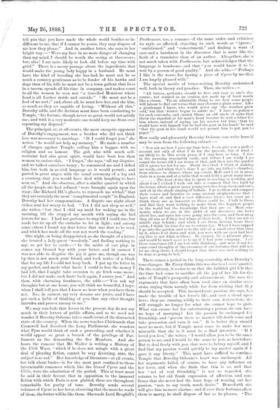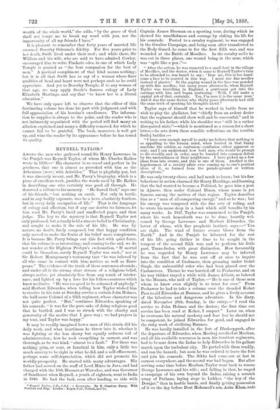BOOKS.
DOROTHY OSBORNE'S LOVE-LETTERS.*
EVERY reader of Lord Macaulay's essays knows something of Dorothy Osborne ; but we have to thank Mr. Parry, and still more the owner of Dorothy's love-letters, for enabling us to form an intimate acquaintance with this charming woman through the long years of Sir William Temple's courtship. There was true love on both sides, and it did not run smooth ; indeed, every kind of obstacle was opposed to the union. Temple had but a small income and no certainty of position when the lovers met. His father, Master of the Rolls in Ireland, was on the popular side in the contention between Charles and his Parliament ; Sir Peter Osborne was a loyalist. As Governor of Guernsey, he held that island for the King, but was at length forced to resign his command. At the inter- vention of his father-in-law, he was allowed to retire to his estate at Chicksands, in Bedfordshire, where Dorothy, who must have been a beauty, was amused or worried by a number of lovers—servants, she calls them—of whom some were in high position, the most distinguished being Henry Cromwell. The lively girl, though already in love with Temple, does not seem to have dismissed them summarily, for she asks Cromwell to obtain for her an Irish greyhound; and there is excellent fooling, with a touch perhaps of feminine vanity, in the account she gives of her wooers to Temple. In the first letter, three of these suitors are described. Of one of them Dorothy writes :—" He protested he liked me so well, that he was very angry my father would not be persuaded to give £1,000 more with me ; and I him so ill, that I vowed if I had £1,000 less I should have thought it too much for him. And so we parted." Then some friends proposed a widower to her, whom she nicknames the " Emperor," " that had four daughters all old enough to be my sisters ; but he had a great estate, was as fine a gentleman as ever England bred, and the very pattern of wisdom. I that knew how much I wanted it thought this the safest place for me to engage in, and was mightily pleased to think I had met with one at last that had wit enough for himself and me too. But shall I tell you what I thought when I knew him ? (you will say nothing on't), 'twas the vainest impertinent, self-conceited, learned coxcomb that ever I saw." Then a modest melancholy man comes forward, whose head is so taken up with philosophic studies that Dorothy wonders how she found a room there. And we have a story of a rich knight that " has promised me this seven years to marry me whensoever his wife died, and now he's dead before her, and has left her such a widow it makes me mad to think on't,—£1,200 a year jointure, and L20,000 in money and personal estate ; and all this I might have had if Mr. Death had been pleased to have taken her instead of him."
All the time she prattles about her lovers, we see, as Temple must have seen, how fixed her affection was, and when Henry Cromwell makes an offer, she writes :—" I shall not blush to
• Letters from Dorothy Osborne to Sir William Temple. 16044. Edited by Edward Abbott Parry. London : Griffith and Ferran. 1888. tell you that you have made the whole world besides so in- . different to me, that if I cannot be yours, they may dispose of me how they please." And in another letter, she says in her bright way :—" Were my face in no more danger of changing than my mind, I should be worth the seeing at threescore ; but, alas ! I am more likely to look old before my time with grief." There is a merry passage about the ingredients that would make the young lady happy in a husband. He must have the kind of breeding she has had, he must not be so much a country gentleman as to be fonder of his hawks and dogs than of his wife, he must not be a town gallant that lives in a tavern, spends all his time in company, and makes court to all the women he sees, nor " a travelled Monsieur whose head is all feather inside and outside." " He must not be a fool of no sort ;" and, above all, he must love her, and she him, as much as they are capable of loving. " Without all this," Dorothy adds, and the decision must have been comforting to Temple, " his fortune, though never so great, would not satisfy me ; and with it a very moderate one would keep me from ever repenting my disposal."
The principal, or, at all events, the most energetic opponent of Dorothy's engagement, was a brother who did not think love was necessary to marriage. " If I could forget you," she writes, " he would not help my memory." He made a number of charges against Temple, calling him a beggar, with no religion and no honour. The girl, who with much self- restraint had also great spirit, would have been less than woman to endure this. " I forgot," she says, "all my disguise, and we talked ourselves weary ; he renounced me and I defied him, but both in as civil language as it would permit ; and parted in great anger, with the usual ceremony of a leg and a courtesy, that you would have died with laughing to have seen us." And she observes, after a similar quarrel in which all the people she had refused " were brought again upon the stage, like Richard III.'s ghosts, to reproach me withal," that they are certainly the most " complimental couple" in England. Dorothy had her compensations. A dispute one night about riches sent her weary to bed. " Yet I did not sleep so well," she writes, "but that I chid my maid for waking me in the morning, till she stopped my mouth with saying she had letters for me. I had not patience to stay till I could rise, but made her tie up all the curtains to let in light; and among some others I found my dear letter that was first to be read, and which has made all the rest not worth the reading."
One night, on being disappointed, as she thought, of a letter, she treated a lady-guest "woodenly," and finding nothing to say, so got her to cards :—" In the midst of our play, in comes my blessed boy with your letter, and in earnest I was not able to disguise the joy it gave me, though one was by that is not much your friend, and took notice of a blush that for my life I could not keep back. I put up the letter in my pocket, and made what haste I could to lose the money I had left, that I might take occasion to go fetch some more; but I did not make such haste back again, I assure you." And then, with charming frankness, she adds You ask my thoughts but at one hour; you will think me bountiful, I hope, when I shall tell you that I know no hour when you have them not. No; in earnest, my very dreams are yours, and I have got such a habit of thinking of you, that any other thought intrudes and proves uneasy to me."
We may conclude that lovers in the present day do not say much in their letters of public affairs, and so we need not wonder if Dorothy Osborne takes small count of the distracted state of the country. When the news reaches Chick sands that Cromwell had dissolved the Long Parliament, she wonders what Pym would think of such a proceeding, and whether it would appear so great a breach of the privilege of Par- liament as the demanding the five Members. And she hears the rumour that Mr. Waller is writing a History of the Civil Wars, " which if he does not mingle with a great deal of pleasing fiction, cannot be very diverting, sure, the subject is so sad." Her knowledge of literature—at all events, her talk about books—is for the most part confined to those interminable romances which, like the Grand Cyrus and the Clelie, were the admiration of the period. This at least must be said in their favour, that in opposition to the immoral fiction with which Paris is now glutted, these are throughout remarkable for purity of tone. Dorothy sends several volumes of Cyrus to her lover, observing that the more he reads of them, the better will he like them. She reads Lord Broghill's Parthenesia, too, a romance of the same order, and criticises its style as affected, objecting to such words as "ignore;' " ambitioned," and " concernment," and finding a want of ease and a harshness in the discourse that is more like the fault of a translator than of an author. Altogether, she is not much taken with Parthenesia, but acknowledges that the language is handsome, and that " you would know it to be writ by a person of good quality." And she adds,—" Perhaps I like it the worse, for having a piece of Cyrus by me that I am hugely pleased with." The special merits of letter-writing Dorothy understood well, both in theory and practice. Thus, she writes :— "All letters, methinks, should be free and easy as one's dis- course; not studied as an oration, nor made up of hard words like a charm. 'Tis an admirable thing to see how sonic people will labour to find out terms that may obscure a plain sense. Like a gentleman I know, who would never say ' the weather grew cold,' but that winter began to salute us. I have no patience for such coxcombs, and cannot blame an old uncle of mine that threw the standish at his man's head because he writ a letter for him where, instead of saying (as his master bid him) ` that he would have writ himself but he had the gout in his hand,' he said that the gout in his hand would not permit him to put pen to paper'" How easily and pleasantly Dorothy Osborne can write herself may be seen from the following extract :— " You ask me how I pass my time here. I can give you a perfect account not only of what I do for the present, but of what I am likely to do this seven years, if I stay here so long. I rise in the morning reasonably early, and before I fun ready I go round the house till I our weary of that, and then into the garden till it grows too hot for me. About 10 o'clock I think of making me ready, and when that's done I go into my father's chamber, from whence to dinner, where my cousin Moll and I sit in great state in a room and at a table that would hold a great many more. The heat of the day is spent in reading or working, and about 6 or 7 o'clock I walk out into a common that lies hard by the house, where a great many young wenches keep sheep and cows, and sit in the shade singing of ballads. I go to them and compare their voices and beauties to sonic ancient shepherdesses that I have read of, and find a vast difference there ; but trust me I think these are as innocent as those could be. I talk to them, and find they want nothing to make them the happiest people in the world but the knowledge that they are so. Most com- monly, when we are in the midst of our discourse, one looks about her, and spies her cows going into the corn, and then away they all run as if they had wings at their heels. I that am not so nimble stay behind ; and when I see them driving home their cattle, I think 'tis time for me to return too. When 1 have supped I go into the garden, and so to the side of a small river that runs by it, where I sit down and wish you were with me (you had best say this is not kind, neither). In earnest, 'tis a pleasant place, and would be much more so to me if I had your company. I it there sometimes till I am lost with thinking ; and were it not for some cruel thoughts of the crossness of our fortunes that will not let me sleep there, I should forget that there was such a thing to be done as going to bed."
There comes a period in the long courtship when Dorothy's tone changes. Mr. Parry thinks this was due to a lovers' quarrel _ On the contrary, it seems to us that the faithful girl felt that the time had come to sacrifice all the joy of her life for the sake of Temple's prosperity and advancement. She uses the arguments that have often been used since on similar occa- sions, urging them warmly while far from wishing that they should be accepted. This inconsiderate passion, she says, has made the trouble of her lover's life, and east a cloud upon hers; they are running wildly to their own destruction ; she will struggle no longer for what she cannot hope to gain. What can excuse her for entertaining a person she can have no hope of marrying ? Let the passion be exchanged for friendship, and " govern there as master till death come and take possession and turn it out." It is better they should meet no more, but if Temple must conic to make her more miserable than she is, it must be a final interview. " If I loved you less," she writes, " I would allow you to be the same person to me, and I would be the same to you, as heretofore- But to deal freely with you, that were to betray myself, and I find that my passion would quickly be my master again if I gave it any liberty." This must have sufficed to convince Temple that Dorothy Osborne's heart was unchanged. All her arguments failed, of course, to have any influence on her lover, and when she finds that this is so, and that her " act of real friendship " is not so regarded, she returns to her old frank expression of affection, and con- fesses that she never had the least hope of wearing out her passion, "nor, to say truth, much desire." Henceforth she will give him no more alarms ; and if ever their fortunes allow them to marry, he shall dispose of her as he pleases. "The wealth of the whole world," she adds, " by the grace of God shall not tempt me to break my word with you, nor the importunity of all my friends I have."
It is pleasant to remember that forty years of married life crowned Dorothy Osborne's fidelity. For five years prior to her death, Swift lived under their roof ; and while there, Sir William and his -wife, who are said to have admired Cowley, encouraged him to write Pindaric odes, in one of which Lady Temple is praised as " the best companion for the best of men." A poetical compliment of that kind means nothing ; but it is all that Swift has to say of a woman whose finer qualities of head and heart were not perhaps such as he could appreciate. And yet to Dorothy Temple, if to any woman of that age, we may apply Steele's famous eulogy of Lady Elizabeth Hastings, and say that " to know her is a liberal education."
We have only space left to observe that the editor of this fascinating volume has done his part with judgment, and with full appreciation of his heroine's excellences. The informa- tion he supplies is always to the point, and the reader who is not intimately acquainted with the period will find many an allusion explained and many a difficulty removed, for which he cannot fail to be grateful. The book, moreover, is well got up, and wins the reader by its appearance before he has tested its quality.




































 Previous page
Previous page